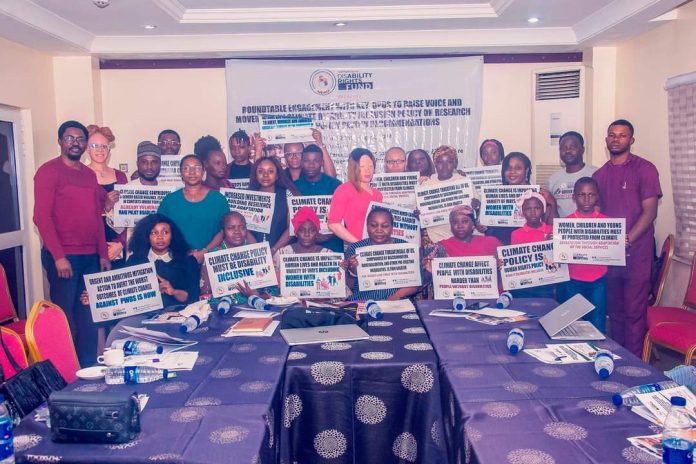On Thursday, August 22nd, 2024, the Advocacy for Women with Disabilities Initiative (AWWDI) made significant strides toward bridging the gap between climate change policies and the needs of persons with disabilities. The event, held at the Barcelona Hotel in Wuse 2, Abuja, served as a pivotal roundtable engagement that brought together a diverse group of stakeholders, including key Organizations of Persons with Disabilities (OPDs). Supported by the Disability Rights Fund (DRF), this gathering was more than just a discussion—it was a critical exploration of how climate change disproportionately impacts those with disabilities and what can be done to address this inequity.
The timing of the event couldn’t be more pressing. As the world grapples with increasingly severe climate events, it’s become evident that the most vulnerable populations, including persons with disabilities, bear the brunt of these changes. The roundtable was designed to ensure that the voices of these often-overlooked communities are not only heard but are integral to shaping inclusive climate policies.
The Agenda: Linking Climate Change and Disability
The engagement centered on reviewing recent research findings that highlight the unique challenges faced by persons with disabilities in the context of climate change. These challenges range from increased exposure to climate-induced disasters to barriers in accessing relief and recovery efforts. Participants delved into policy recommendations that advocate for a more inclusive approach to climate action—one that recognizes and addresses the specific needs of persons with disabilities.
One of the key themes of the day was the importance of inclusive disaster preparedness and response. Participants discussed how current systems often fail to accommodate persons with disabilities, leaving them more vulnerable during emergencies. The roundtable underscored the need for climate policies that are not just inclusive in theory but are backed by concrete actions that safeguard the rights and well-being of persons with disabilities.
Voices from the Roundtable
The engagement provided a platform for various OPDs to share their experiences and insights. These contributions were invaluable in understanding the real-world implications of climate policies—or the lack thereof—on persons with disabilities. Representatives from these organizations emphasized that while climate change is a global issue, its effects are felt differently by different populations. For persons with disabilities, the impact is often compounded by pre-existing barriers to accessibility, healthcare, and social services.
A recurring point of discussion was the need for more data on how climate change affects persons with disabilities. Participants called for more research and documentation to ensure that the specific challenges faced by this group are recognized and addressed in climate action plans. This data, they argued, is crucial for designing interventions that are truly inclusive and effective.
A Step Toward Inclusive Climate Policies
The roundtable concluded with a strong call to action: climate policies must be inclusive and proactive in safeguarding the rights of persons with disabilities. The support from the Disability Rights Fund was lauded as instrumental in making this engagement possible, enabling a rich exchange of ideas and the formulation of strategies to push for more inclusive climate action.
AWWDI, in its commitment to advocating for the rights of women with disabilities, recognized this event as a significant milestone. The organization reaffirmed its belief that true climate action cannot be achieved without considering the diverse needs of all individuals, particularly those who are most vulnerable.
Moving Forward
As the day ended, it was clear that this roundtable was just the beginning. AWWDI and its partners are now looking to build on the momentum generated by this engagement. The insights and strategies developed during the event will be crucial in advocating for policies that are not just inclusive but are also actionable and responsive to the needs of persons with disabilities.
The event highlighted the critical intersection between climate change and disability, a nexus that is often overlooked in policy discussions. With continued support from organizations like DRF and the active involvement of OPDs, there is hope that future climate policies will be more inclusive, ensuring that no one is left behind in the fight against climate change.
As AWWDI continues its advocacy work, it remains committed to ensuring that the voices of persons with disabilities are at the forefront of the climate action agenda. This roundtable engagement marks a significant step towards achieving that goal, paving the way for more inclusive and equitable climate policies in Nigeria and beyond.


